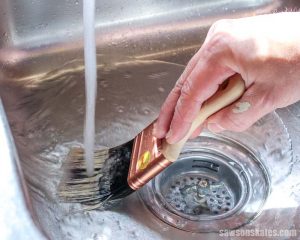Explore the Is It Ok To Wash Paint Brushes In The Sink article containing information you might be looking for, hopefully beneficial for you.

Is It OK to Wash Paint Brushes in the Sink?
As an avid painter, I’ve spent countless hours creating colorful masterpieces on my canvas. Over time, my paintbrushes became an extension of my creativity, and I wanted to ensure their longevity. I pondered, “Is it acceptable to wash my paintbrushes in the sink?” This simple question sparked an intriguing journey into the proper care and maintenance of these essential tools.
The sink, with its constant flow of water and accessible location, seemed like the perfect place to wash paintbrushes. However, lurking beneath the surface were potential risks that could jeopardize the integrity of my brushes. Concerns arose about clogging drains with paint residue, damaging the brush’s shape due to vigorous scrubbing against the sink’s surface, and exposing my plumbing to harmful chemicals found in some paints.
The Importance of Proper Brush Maintenance
Paintbrushes are indispensable tools for painters, allowing them to apply paint with precision and artistry. Their quality and condition directly impact the final outcome of a painting. Proper maintenance ensures that brushes remain in optimal shape, delivering consistent results throughout their lifetime.
Neglecting brush maintenance can lead to a myriad of problems. Dried paint can stiffen bristles, making them less responsive and prone to breakage. Caked-on paint residue can clog the ferrule, the metal part that holds the bristles together, compromising the brush’s ability to hold paint effectively. Additionally, improper cleaning can lead to the growth of bacteria and mold, posing health risks and potentially damaging the brush’s structure.
Sink-Safe Alternatives for Brush Cleaning
While washing paintbrushes in the sink may not be the most recommended method, there are sink-safe alternatives that effectively remove paint residue without compromising the brush’s integrity.
Dish soap and water: A simple solution of warm water and dish soap can effectively clean most water-based paints. Gently swish the brush in the soapy water, being careful not to scrub too vigorously. Rinse thoroughly with clean water to remove any remaining soap residue.
Solvents: For oil-based paints or particularly stubborn water-based paints, solvents such as mineral spirits or turpentine may be necessary. However, these solvents can be harsh on both the brush and the environment, so use them sparingly and with proper ventilation.
Expert Tips for Paintbrush Care
To ensure the longevity of your paintbrushes, follow these additional expert tips:
- Clean brushes immediately: Don’t wait until paint dries on the brush; clean it immediately after use. This will prevent paint from hardening, making it easier to remove.
- Gently wash: Avoid scrubbing brushes vigorously, as this can damage the bristles and ferrule. Instead, use a soft touch and gentle circular motions.
- Rinse thoroughly: After washing, rinse the brush thoroughly with clean water to remove any remaining paint or cleaning solution.
- Reshape bristles: Once the brush is clean, reshape the bristles by gently combing them with a fine-toothed comb or your fingers.
- Store properly: Store brushes vertically with the bristles facing up to prevent water or paint from seeping into the ferrule.
Frequently Asked Questions
- Q: Can I wash all types of paintbrushes in the sink?
A: No, not all types of paintbrushes can be safely washed in the sink. Natural-bristle brushes, such as those made from hog hair or sable, can absorb water and swell, causing the bristles to become loose or fall out. Synthetic-bristle brushes are more durable and can withstand water, making them suitable for sink cleaning. - Q: How often should I clean my paintbrushes?
A: The frequency of cleaning depends on how often you use your brushes and the type of paint you are using. As a general rule, clean your brushes after each use, especially if you are using oil-based paints. - Q: Can I use a brush cleaner?
A: Yes, brush cleaners are available and can be effective for removing paint residue. However, always test the cleaner on an inconspicuous area of the brush first to ensure it does not damage the bristles or ferrule.
Conclusion
Washing paintbrushes in the sink can be a convenient solution, but it is essential to understand the potential risks and take necessary precautions. Sink-safe alternatives, such as dish soap and water or solvents, can effectively remove paint residue without compromising the brush’s integrity. By following expert tips on proper brush maintenance and adhering to sink-safe cleaning methods, you can ensure that your paintbrushes remain in optimal condition, empowering you to create beautiful works of art for years to come.
Are you interested in learning more about the proper care and maintenance of your painting tools? Explore our website for additional resources and expert insights to elevate your painting skills.

Image: sawsonskates.com
An article about Is It Ok To Wash Paint Brushes In The Sink has been read by you. Thank you for visiting our website, and we hope this article is beneficial.